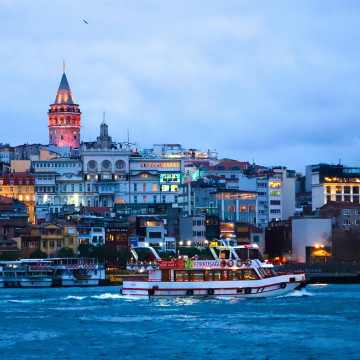Pliska - Bulgarias first Capital
Położenie pokaż na mapie
Pliska
- Kategoria: ancient
- Sekcja: Cities Ancient
Pliska was the capital of Bulgaria between 681 and 893 AD. According to a Bulgarian chronicle, it was founded by Khan Asparukh. It is called Pliskusa by Georgios Kedrenos and Anna Comnena. It had an area of 23 km² and was surrounded by a moat and earthwork ramparts. The walls of the inner fortress were 2.6 meters thick and about 12 meters high.
Pliska was sacked by the Byzantine army in 811, but the invaders were soon driven out by Khan Krum (see Battle of Pliska). Khan Asparukh brought in artisans and craftsmen to improve the city. In 886, Boris I founded the Pliska Literary School (after 893 Preslav Literary School), which was headed by Naum of Preslav.
In 892, the city became the scene of a pagan revolt led by King Vladimir. After the crushing of the revolt, Vladimir was dethroned and the third son of Boris I, Simeon, was installed into power. One of the first steps of the new ruler was to move the capital to Preslav, a fortified town in the vicinity of Pliska, probably because of the steadily strong pagan influence in the old capital.
The importance of Pliska gradually waned throughout the 10th century with the concentration of power and resources in Preslav. The city was destroyed during the assaults of the Kievan Rus' and the Byzantine Empire between 969 and 972 and was not rebuilt again.
The ruins of the city of Pliska lie 3 km north of the modern village of Pliska. The site of the city is currently a National Archaeological Reserve. Ruins of the Great and the Small Palace, the strong stone fortifications and the Great Basilica (c. 875), one of the largest Christian places of worship of its time, used both as a royal church and as a national patriarchal cathedral, can be seen in the reserve.
Pliska was sacked by the Byzantine army in 811, but the invaders were soon driven out by Khan Krum (see Battle of Pliska). Khan Asparukh brought in artisans and craftsmen to improve the city. In 886, Boris I founded the Pliska Literary School (after 893 Preslav Literary School), which was headed by Naum of Preslav.
In 892, the city became the scene of a pagan revolt led by King Vladimir. After the crushing of the revolt, Vladimir was dethroned and the third son of Boris I, Simeon, was installed into power. One of the first steps of the new ruler was to move the capital to Preslav, a fortified town in the vicinity of Pliska, probably because of the steadily strong pagan influence in the old capital.
The importance of Pliska gradually waned throughout the 10th century with the concentration of power and resources in Preslav. The city was destroyed during the assaults of the Kievan Rus' and the Byzantine Empire between 969 and 972 and was not rebuilt again.
The ruins of the city of Pliska lie 3 km north of the modern village of Pliska. The site of the city is currently a National Archaeological Reserve. Ruins of the Great and the Small Palace, the strong stone fortifications and the Great Basilica (c. 875), one of the largest Christian places of worship of its time, used both as a royal church and as a national patriarchal cathedral, can be seen in the reserve.
Położenie na mapie / Jak tam dojechać
Znajdź nocleg w pobliżu (Wyszukianie noclegów w pobliżu tej budowli jest obsługiwane przez Booking.com)
Pogoda w okolicy
Dzisiaj (27 kwietnia)

18.9 ° C
8.7 ° (min) 19.8 ° (max)
0 mm
4.4 m/s
1020 hPa
Jutro (28 kwietnia)

19.7 ° C
8.7 ° (min) 21 ° (max)
0 mm
5.6 m/s
1023 hPa



Opinie o Pliska - Bulgarias first Capital Dodaj komentarz
Bądź pierwszym, który doda opinię!